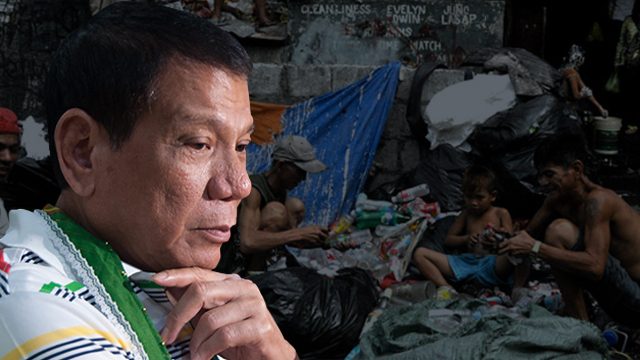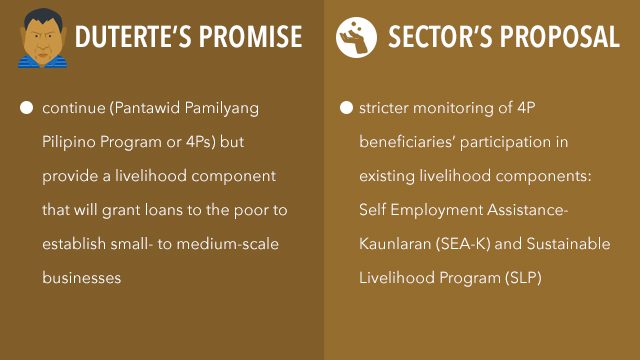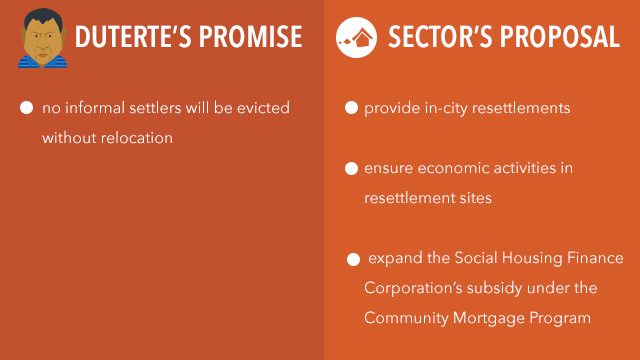SUMMARY
This is AI generated summarization, which may have errors. For context, always refer to the full article.

MANILA, Philippines – On Monday, July 25, President Rodrigo Duterte will face the country for his first State of the Nation Address (SONA).
The President is mandated by the Constitution to address Congress every fourth Monday of July, when it opens its regular session, to report the administration’s accomplishments and plans for the year.
Duterte is expected to lay down his legislative agenda that he wants Congress to prioritize. Besides his all-out war against crime and corruption, the President has also made remarkable promises to long neglected sectors in the country.
What do members of these marginalized sectors have to say about these pronouncements? What do they want to hear from the President in his first SONA?
Agriculture

In a dialogue with the Kilusang Magbubukid ng Pilipinas (KMP) shortly before the campaign period started on February 9, Duterte promised to distribute land to farmers who have long rallied for land reform. He also vowed to subsidize farming inputs – fertilizer and seeds – and free irrigation to improve agricultural productivity. (READ: Duterte to push for land reform, free irrigation for farmers)
KMP Secretary-General Antonio Flores lauded Duterte’s commitment but wished that the President would push for a “genuine land reform” through free land distribution. KMP is among the militant peasant groups that have rallied for decades to be given the lands they tilled, based on the Comprehensive Agrarian Reform Program (CARP).
Meanwhile, Chito Medina of farmer-scientist partnership organization Masipag recommends that the government focus on promoting organic farming rather than fertilizer and seed subsidies.
“Through organic farming, farmers can produce their own seeds from their harvest and make their own fertilizer by learning how to build compost pits,” he told Rappler in a mix of English and Filipino.
Medina said their research revealed that organic and chemical farming yield the same volume of produce but at a cheaper cost. He explained that organic farming would allow farmers to be sustainable since they can save on costs by not having to buy seeds and fertilizers.
Labor

Associated Labor Union (ALU) Policy Advocacy Officer Allan Tanjusay said Duterte should specify in his speech how he would implement income tax reforms.
“Magkakaroon ng income tax cut – progressive ba ‘yan o daglian ba ‘yan na from 32% to 12%? Kailangan malinaw sa SONA,” he said in a phone interview.
(There will be income tax cuts – would it be progressive or from 32% to 12% in a snap? It should be clear in his SONA.)
During the campaign, Duterte promised to exempt from income tax payment workers earning P20,000 and below. Finance Secretary Carlos Dominguez III said earlier that the administration will “definitely review” review the taxation system and “eventually lower income tax rates.”
Income tax reform has been a popular proposal in the 16th Congress but all bills filed remained stagnant at the House Committee on Ways and Means.
Aside from amending tax schemes, Duterte also said he would end contractualization, or the practice of hiring temporary workers without providing them benefits.
Tanjusay stressed that the perennial labor issue lies in the implementation of the laws against contractualization.
The Department of Labor and Employment should be able to closely monitor compliance to the law. But Tanjusay said there are only over 500 labor law enforcers at the Bureau of Working Conditions tasked to inspect more than 900,000 workplaces nationwide.
Children

The President had said that he wants to amend Republic Act 9344 or the Juvenile Justice System Act, which criminalizes juvenile offenders aged 15 and above. Duterte has proposed a lower age limit. Law enforcers have complained of difficulty in dealing with cases involving minors.
Duterte ally and presumptive House Speaker Pantaleon Alvarez and Capiz 2nd District Representative Fredenil Castro have filed a measure following Duterte’s pitch. This was criticized by Senators Bam Aquino and Francis Pangilinan, the author of RA 9344.
Although Alvarez said his bill will focus on rehabilitating young delinquents, Save the Children Philippines Child Rights Governance Director Minerva Cabiles emphasized that it is better to address the root causes than creating a “destiny of crime” for these young people who are at a crucial stage of development.
“These children are actually coming from a violent home, with no guidance from parents, coming from poor families,” said Minerva in a mix of English and Filipino.
“These children…are often used (by syndicates); even their own parents are using them for crime,” she said.
Poverty

Beneficiaries of the Pantawid Pamilyang Pilipino Program (4Ps) want to hear from Duterte that he will continue the flagship anti-poverty scheme of the Aquino administration.
“It helps us a lot on our daily needs. If we’re short of cash, that’s where we source funds. It is also where we get the capital for our small store,” community leader Merline Juanillo said in Filipino.
Duterte, as a presidential candidate, promised to expand 4Ps by providing a livelihood component. Social Welfare Secretary Judy Taguiwalo, meanwhile, said that she wants to review the program but opposes moves to institutionalize it through legislation.
4Ps beneficiaries laud the program’s expansion but they suggest that the government look into the current economic components already in place such as the Self-Employment Assistance-Kaunlaran (SEA-K) and Sustainable Livelihood Program (SLP).
SEA-K grants 4Ps households capital to start an enterprise with other beneficiaries; SLP helps older members of the family to be enrolled in vocational courses and find jobs.
“Sa isang grupo, 5. Kailangan lahat kayo gumagalaw. [Merong] mga ayaw magbigay ng share para sa kanila,” Juanillo said, suggesting to closely monitor the participation of families given the capital grant.
(In one group, there are 5 [family members]. All family members should do their part. There are those who do not contribute [to the group’s workload].)
Meanwhile, community leader Belinda delos Santos said the government should prioritize 4Ps families in their cash for work programs, which they used to implement.
Housing

Duterte earlier said that he will not let informal settlers remain homeless by barring demolitions until there are proper relocation sites for them.
But some families living in private land still fear eviction if they do not buy the property where their houses are built.
Vangie Narzo, a leader of a group pushing for their tenure of stay in their homes in Barangay Payatas, said the government, through the Social Housing Finance Corporation’s (SHFC) Community Mortgage Program (CMP), helps them afford the lands but through limited means.
“We shoulder the survey of the lands that cost at least P8,000 per family. CMP also only subsidize 36 square meters, a small part of our lands that measure up to 700 square meters,” she said in Filipino.
Narzo said SHFC should expand the program and give them more leeway in terms of payment since they are ordered to leave their homes when they fail to settle their dues in 3 months.
If given the chance, Narzo said they would want to be relocated where there are employment opportunities, hopefully within the city. Families given homes outside the city often sell these houses because of lack of livelihood and job prospects in their relocation site, and just go back to the city.
Gawad Kalinga leader Justine Cruz, who lead some of the non-governmental organization’s housing projects, proposed their model in building sustainable communities.
“We are raising social entrepreneurs to partner with communities – not just as laborers [but business partners]. Tap into their potential. That is one model we can look into,” Cruz told Rappler in a phone interview.
He also said the government can also grant capital to recipients of in-city housing to build small enterprises since there are clients within the area.
Duterte’s housing chief, Vice President Leni Robredo, earlier said that she plans to address the 1.4-million public housing backlog by building houses inside the city in partnership with the private sector. – Rappler.com
Add a comment
How does this make you feel?
There are no comments yet. Add your comment to start the conversation.